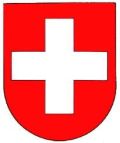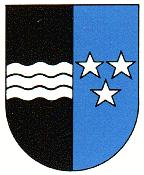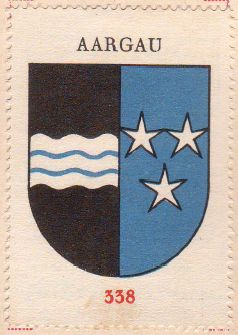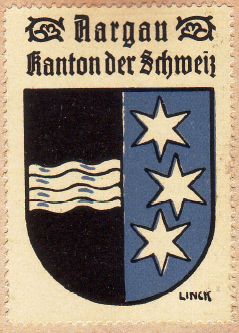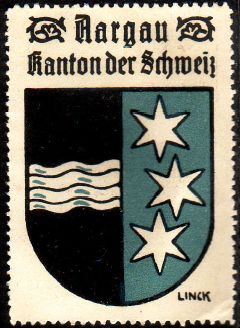Aargau: Difference between revisions
Knorrepoes (talk | contribs) m (Text replacement - "}} '''" to "}} '''") |
Knorrepoes (talk | contribs) m (Text replacement - "|center|Wappen von {{PAGENAME}}]] " to "|center|alt=Wappen von {{PAGENAME}} / Arms of {{PAGENAME}}]] ") |
||
| Line 3: | Line 3: | ||
''' AARGAU''' | ''' AARGAU''' | ||
[[File:aargau.jpg|center|Wappen von {{PAGENAME}}]] | [[File:aargau.jpg|center|alt=Wappen von {{PAGENAME}} / Arms of {{PAGENAME}}]] | ||
===Official blazon=== | ===Official blazon=== | ||
Revision as of 09:01, 16 August 2022
Swiss heraldry portal
This page is part of the Swiss heraldry portal |
Heraldry of the World |
|
Swiss civic heraldry:
|
Other heraldry: |
AARGAU
Official blazon
Origin/meaning
The area known as the Aargau was conquered by Bern in 1415 and thus became a part of the Canton of Bern. The area was divided in four cities and the other areas (the 'freie Ämter'). The latter often used arms divided of blue and gold, on which was placed a pillar of silver, with a thread (or snake) winding around the pillar. These arms were, however, no official arms. In official documents a blank shield was used for the area.
| The arms of the 'freie Ämter'. |
The Canton Aargau was established by Napoleon in 1803. On April 20, 1803, the 'civilian' Ringier proposed the present arms. No explanation was given for the design of the new arms. It was later explained as the river Aare and the three territories which were combined to the new canton; the Berner areas, the county Baden and the Fricktal valley.
The new arms were widely used, but as the position of the stars was not defined, the stars were shown 1:2, 2:1 or 1:1:1. In 1930 the position was finally defined as 2:1.
| |
Variations of the arms in the Kaffee Hag albums 1914-1960 |
|
Contact and Support
Partners:
Your logo here ?
Contact us
© since 1995, Heraldry of the World, Ralf Hartemink 
Index of the site
Literature : Mühlmann, L. : Wappen und Fahnen der Schweiz, Bühler Verlag, Lengnau, 1977 and 1997.

